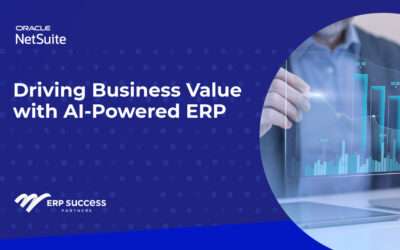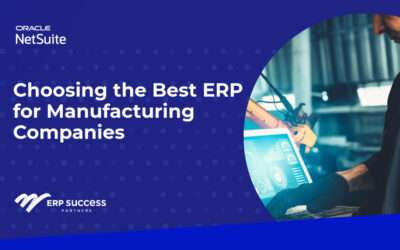In today’s fast-paced and constantly evolving business landscape, it’s becoming increasingly difficult to build a business that can withstand the test of time. According to the U.S. Bureau of Labor Statistics, roughly 20% of small businesses nationwide fail within their first year of opening, and only about 30% make it to year ten.
Building a business that can stand the test of time requires a well-thought-out approach that factors in current economic conditions, core challenges, and the available business opportunities. One essential tool that can help businesses achieve this goal is Enterprise Resource Planning (ERP) software.
Providing End-to-End Business Management
ERP software, such as NetSuite, provides end-to-end business management and helps companies manage their finances, human resources, manufacturing/distribution, sales channels, e-commerce storefronts, and more. It not only helps companies address their immediate challenges but also helps them scale up and prepare for what’s coming around the next corner.
One of the key benefits of using an ERP system is having access to real-time data and information. With an ERP like NetSuite in place, companies get a reliable, real-time picture of everything that’s going on in their operations, both operationally and financially, whenever they need it. That means no more waiting around for days or weeks for reports to be generated and shared; it’s all right at the manager’s or leader’s fingertips 24/7/365. This, in turn, leads to better and faster decision-making in any business conditions.
Headed into Another Change, Staying Agile & Resilient
In today’s uncertain economic environment, having a clear view of your company’s financial performance is crucial. With an ERP system, you can have visibility into the performance of your business and make informed decisions about how to weather the storm. For example, NetSuite helps keep a company’s books accurate, up to date, and accessible at all times. Real-time dashboards allow monitoring of key performance indicators across the business, including headcount and all operational data. The ERP also provides budgeting, forecasting, and what-if scenario tools.
Improving Business Health
ERP systems are also particularly valuable because they help companies integrate and track all of their financial metrics on a single business platform. “ERP solutions and business applications are really there to help executives understand the health of their business and make better decisions,” according to a partner at an accounting firm recently interviewed by CFO Dive. Plus, having a single source of data and information is essential for businesses, and moving ERP systems to the cloud allows for access from anywhere.
Moreover, ERP software like NetSuite helps companies improve cash flow management at a time when this core activity is more important than ever. CFOs can make quick adjustments based on current inventory positions, customer demand, invoices outstanding, and other metrics that can help them stay more agile and resilient in tough times.
Automating Manual Tasks
Finally, automation is an important feature of modern ERP systems. Automation can help businesses close the loop on monitoring cash flow and helps eliminate manual accounts receivable (AR) and accounts payable (AP) tasks, speeding up the process while also reducing the number of errors. Automating manual accounting tasks delivers increased efficiency and better data quality, lowers labor costs, and mitigates risks, including invoice fraud.
Optimize Now. Grow Tomorrow
In conclusion, using an ERP system can be a game-changer for businesses looking to build a company that stands the test of time. ERP software like NetSuite can provide real-time data and reporting dashboards, enabling leaders to closely monitor results and react quickly to changing business conditions. With a reliable implementation partner like ERP Success Partners in your corner, you can take advantage of all that NetSuite has to offer and best position your company for success—both now and well into the future.






